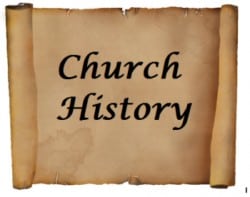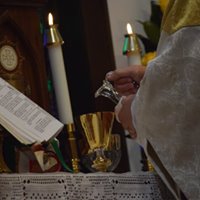Early description of Christian Worship (150-160 AD)
JUSTIN MARTYR
Christian apologist, born at Flavia Neapolis, about A.D. 100, converted to Christianity about A.D. 130, taught and defended the Christian religion in Asia Minor and at Rome, where he suffered martyrdom about the year 165. Two “Apologies” bearing his name and his “Dialogue with the Jew Tryphon” have come down to us
THE FIRST APOLOGY OF JUSTIN
To the Emperor Titus Ælius Adrianus Antoninus Pius Augustus Caesar, and to his son Verissimus the Philosopher, and to Lucius the Philosopher, the natural son of Caesar, and the adopted son of Pius, a lover of learning, and to the sacred Senate, with the whole People of the Romans, I, Justin, the son of Priscus and grandson of Bacchius, natives of Flavia Neapolis in Palestine, present this address and petition in behalf of those of all nations who are unjustly hated and wantonly abused, myself being one of them.
…
CHAPTER LXV — ADMINISTRATION OF THE SACRAMENTS.
But we, after we have thus washed him who has been convinced and has assented to our teaching, bring him to the place where those who are called brethren are assembled, in order that we may offer hearty prayers in common for ourselves and for the baptized [illuminated] person, and for all others in every place, that we may be counted worthy, now that we have learned the truth, by our works also to be found good citizens and keepers of the commandments, so that we may be saved with an everlasting salvation. Having ended the prayers, we salute one another with a kiss. There is then brought to the president (ie. Bishop or Priest) of the brethren bread and a cup of wine mixed with water; and he taking them, gives praise and glory to the Father of the universe, through the name of the Son and of the Holy Ghost, and offers thanks at considerable length for our being counted worthy to receive these things at His hands. And when he has concluded the prayers and thanksgivings, all the people present express their assent by saying Amen. This word Amen answers in the Hebrew language to genoito [so be it]. And when the president has given thanks, and all the people have expressed their assent, those who are called by us deacons give to each of those present to partake of the bread and wine mixed with water over which the thanksgiving was pronounced, and to those who are absent they carry away a portion.
CHAPTER LXVI — OF THE EUCHARIST.
And this food is called among us Eukaristia [the Eucharist], of which no one is allowed to partake but the man who believes that the things (ie. taught – informed – you could say a Confirmation of what they know) which we teach are true, and who has been washed (ie. Baptized) with the washing that is for the remission of sins, and unto regeneration, and who is so living as Christ has enjoined. For not as common bread and common drink do we receive these; but in like manner as Jesus Christ our Saviour, having been made flesh by the Word of God, had both flesh and blood for our salvation, so likewise have we been taught that the food which is blessed by the prayer of His word, and from which our blood and flesh by transmutation are nourished, is the flesh and blood of that Jesus who was made flesh. For the apostles, in the memoirs composed by them, which are called Gospels, have thus delivered unto us what was enjoined upon them; that Jesus took bread, and when He had given thanks, said, “This do ye in remembrance of Me, this is My body;” and that, after the same manner, having taken the cup and given thanks, He said, “This is My blood;” and gave it to them alone. Which the wicked devils have imitated in the mysteries of Mithras, commanding the same thing to be done. For, that bread and a cup of water are placed with certain incantations in the mystic rites of one who is being initiated, you either know or can learn.



